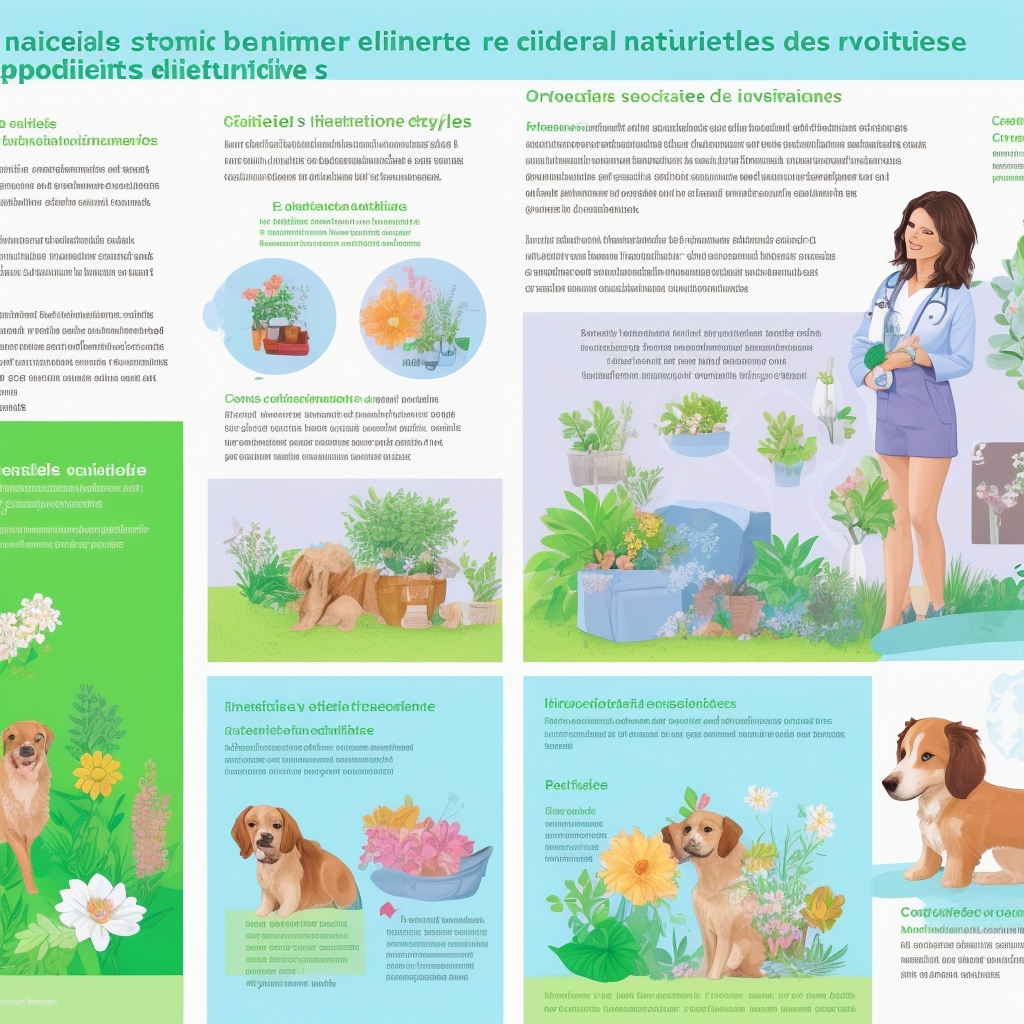5 Natural Remedies to Relieve Itching in Dogs: Expert-Backed Solutions for Lasting Comfort
Excessive scratching in dogs is a common problem that can be both bothersome and worrying for owners. What’s interesting is that it’s more widespread than you might think; recent data indicates that canine atopic dermatitis, a common allergic skin condition, affects anywhere from 3% to 15% of the general canine population, and even up to 58% among dogs presenting with dermatologic conditions. This frustrating behavior can stem from various factors, ranging from food allergies to pesky parasites and underlying skin conditions. Environmental triggers like pollen, dust mites, and seasonal changes can also play a significant role in triggering these uncomfortable episodes. Beyond conventional treatments, many natural remedies can surprisingly help soothe that relentless itch and significantly improve your four-legged companion’s well-being. This comprehensive article dives deep into five effective natural remedies to relieve itching, while also providing practical, expert advice for maintaining your dog’s overall skin health and preventing future flare-ups.
1. Coconut Oil: A Versatile Natural Moisturizer
Benefits
Coconut oil is a true superstar, renowned for its incredible moisturizing and anti-inflammatory properties. It’s fantastic for soothing irritated skin and can really help dial down that persistent itching. Plus, it boasts natural antimicrobial qualities, which is a huge bonus for preventing secondary skin infections. Think of it as a natural shield for your dog’s sensitive skin. The medium-chain fatty acids in coconut oil, particularly lauric acid, have been shown to possess potent antimicrobial properties that can help combat harmful bacteria and fungi that often colonize irritated skin. Additionally, coconut oil contains vitamin E, which acts as a natural antioxidant, helping to repair damaged skin cells and promote healing.
Usage
Applying coconut oil is surprisingly simple. Just take a small amount and gently massage it into the affected areas of your dog’s skin, ensuring it’s well absorbed. For an added internal boost, you can also mix a teaspoon of high-quality, virgin coconut oil into their daily food. This can support their immune system from the inside out, contributing to healthier skin over time. When applying topically, it’s best to use coconut oil at room temperature for easier application. Start with small amounts to avoid making your dog’s coat too greasy, and always choose organic, unrefined coconut oil for the purest benefits. For dogs with extensive skin issues, you can create a therapeutic coconut oil treatment by warming it slightly and adding a few drops of lavender essential oil (specifically formulated for pets) for additional calming properties.
Real-World Insight
I once worked with a spirited Labrador whose owner was at their wit’s end because he’d scratch non-stop after every outdoor adventure. We suspected environmental irritants like grass pollen and dust. After incorporating daily topical applications of coconut oil, the owner was thrilled to report that the scratching dramatically decreased within a week. His skin not only looked healthier but felt noticeably more hydrated – a truly visible improvement. What made this case particularly interesting was that the dog’s coat also became significantly shinier and softer, demonstrating coconut oil’s dual benefits for both skin health and coat quality. The owner now applies coconut oil preventatively before outdoor activities, creating a protective barrier against environmental allergens.
2. Chamomile Infusion: Your Dog’s Calming Tea Bath
Benefits
Chamomile isn’t just for a relaxing cup of tea after a long day; it’s also famous for its powerful anti-inflammatory and soothing properties. For dogs, it can be a real game-changer for calming skin irritations and reducing that maddening itch. It’s one of those gentle yet effective solutions that often surprises owners. Chamomile contains natural compounds called flavonoids, particularly apigenin and luteolin, which have been scientifically proven to reduce inflammation and provide antimicrobial benefits. These compounds work by inhibiting the release of histamines, which are responsible for the itching sensation. Chamomile is also naturally hypoallergenic, making it an excellent choice for dogs with sensitive skin or multiple allergies.
Usage
To prepare a chamomile infusion, simply boil dried chamomile flowers in water for about 10 minutes, just like you would for yourself. Let it cool completely – this is crucial, we don’t want any burns! Then, you can apply the cooled infusion to your dog’s skin using a soft cotton pad or, even easier, a spray bottle. For a more comprehensive approach, consider using the infusion as a final rinse after their regular bath. You can also prepare larger batches and store the cooled infusion in the refrigerator for up to three days, making it convenient for regular applications. For dogs who enjoy baths, you can add the entire cooled infusion directly to their bathwater for a full-body soothing treatment. Some pet owners find success in freezing chamomile tea in ice cube trays, creating cooling chamomile cubes that can be applied directly to hot spots for immediate relief.
Real-World Insight
A client’s adorable Shih Tzu suffered terribly from seasonal allergies, leading to constant paw licking and an irritated belly. We tried a few things, but what really seemed to turn the corner was regular chamomile rinses. After just a few applications, the owner noticed a significant improvement: less frantic scratching and visibly calmer, less inflamed skin. It was a simple solution that made a world of difference. The owner became so convinced of chamomile’s effectiveness that she started using it proactively during allergy season, applying the infusion twice weekly as a preventative measure. This approach significantly reduced the severity and frequency of her dog’s allergic reactions, demonstrating how natural remedies can be used both therapeutically and preventatively.
3. Apple Cider Vinegar: A Natural Skin Purifier
Benefits
Apple cider vinegar (ACV) has long been lauded as a natural remedy, and for good reason. It’s particularly effective for tackling itching and minor skin infections in dogs, thanks to its impressive antifungal and antibacterial properties. It essentially helps to sanitize the skin, creating an environment less hospitable for irritants. The acetic acid in apple cider vinegar helps restore the skin’s natural pH balance, which is crucial for maintaining a healthy skin barrier. When the skin’s pH is balanced, it becomes more resistant to bacterial and fungal overgrowth, which are common secondary complications of chronic scratching. ACV also contains beneficial enzymes and probiotics that can support skin health when used appropriately.
Usage
Here’s the thing though: ACV needs to be diluted properly. Always mix one part apple cider vinegar with one part water. You can apply this mixture to the problem areas using a spray bottle or a cotton pad. A critical tip: always avoid applying it to areas where the skin is open, raw, or severely irritated, as it can sting. Similar to coconut oil, a tiny amount (a teaspoon) can sometimes be added to their food to support their immune system, but always introduce this slowly and monitor for any digestive upset. For dogs with widespread skin issues, you can add a cup of diluted ACV to their bathwater for a full-body treatment. Always use raw, unfiltered apple cider vinegar with the “mother” for maximum benefits, as this contains the beneficial enzymes and probiotics that processed versions lack.
Real-World Insight
I remember a Beagle whose owner was battling persistent itching from flea bites, despite using flea prevention. We decided to try diluted apple cider vinegar topically on the affected spots. Within just a few days of consistent application, the itching subsided noticeably, and what’s more, his coat started looking remarkably shinier and healthier. It was a testament to ACV’s ability to restore skin balance. What made this case particularly memorable was that the owner discovered ACV also seemed to act as a natural flea deterrent – the fleas appeared less attracted to the dog after regular ACV treatments. This dual benefit of treating existing irritation while potentially preventing future flea problems made ACV an invaluable addition to their pet care routine.
4. Oatmeal: The Classic Skin Soother
Benefits
Oatmeal isn’t just for breakfast; it’s an incredibly effective and gentle remedy for relieving itching and deeply moisturizing the skin. It’s particularly beneficial for dogs struggling with widespread issues like dermatitis or environmental allergies, providing a comforting, soothing effect. Oatmeal contains compounds called avenanthramides, which are powerful anti-inflammatory agents that can significantly reduce itching and irritation. These compounds work by inhibiting the production of inflammatory cytokines, providing relief at the cellular level. Oatmeal also contains beta-glucan, a natural moisturizer that forms a protective film on the skin, helping to lock in moisture and protect against further irritation. The saponins in oatmeal act as gentle, natural cleansers that can remove allergens and irritants from the skin without causing additional dryness.
Usage
The most common and effective way to use oatmeal is in a bath. Add colloidal oatmeal (specifically designed for baths, not just your breakfast oats!) to your dog’s lukewarm bath water. Let them soak for a good 10-15 minutes, allowing the soothing properties to penetrate the skin. Alternatively, for more localized irritation, you can create a simple oatmeal paste by mixing plain oatmeal with a little water and applying it directly to the irritated areas. If you don’t have colloidal oatmeal readily available, you can make your own by grinding plain, unflavored oats in a food processor until they form a fine powder. For dogs who are resistant to baths, you can create oatmeal compresses by soaking a clean cloth in cooled oatmeal water and applying it to affected areas for 10-15 minutes. Some pet owners find success in creating oatmeal “socks” by filling clean socks with oatmeal and using them as gentle scrubbers during bath time.
Real-World Insight
I had a Golden Retriever client who always seemed to break out in an itchy rash after rolling around in the garden, likely due to pollen and other environmental allergens. We found that a therapeutic oatmeal bath immediately after his outdoor playtime provided immense relief. The owner was amazed by how quickly the itching subsided, and the dog seemed infinitely more comfortable and less agitated. It’s a simple, low-stress solution that often yields fantastic results. The owner became so proactive with this approach that she started giving preventative oatmeal baths during peak allergy seasons, which dramatically reduced the frequency and severity of her dog’s allergic reactions. This case perfectly illustrates how natural remedies can be integrated into regular grooming routines for ongoing skin health maintenance.
5. Probiotics: For Optimal Gut Health and Beyond
Benefits
This is where it gets fascinating. Many pet owners are surprised to learn that intestinal imbalances can frequently manifest as allergies and persistent itching in dogs. Probiotics are live beneficial bacteria that help restore a healthy gut flora, which in turn plays a crucial role in strengthening the immune system. A healthy gut often means healthier skin. Recent research, including multiple studies published in 2024, continues to highlight the intricate connection between gut health and skin conditions like atopic dermatitis, emphasizing that imbalances in gut microbiota can lead to inflammatory skin issues. The gut-skin axis is a complex communication network where gut bacteria influence immune responses that directly affect skin health. When the gut microbiome is balanced, it produces beneficial metabolites that reduce systemic inflammation and support the skin’s natural barrier function.
Usage
The key here is to add dog-specific probiotics to your companion’s food. It’s vital to consult your veterinarian to choose a product that’s not only reputable but also suitable for your dog’s specific age, weight, and health conditions. They can guide you on the right strains and dosage (typically 1-10 billion colony-forming units (CFUs) daily) to ensure maximum benefit without any adverse reactions. Look for probiotics that contain multiple strains, including Lactobacillus acidophilus, Bifidobacterium animalis, and Enterococcus faecium, as these have shown particular benefits for canine skin health. Probiotics work best when given consistently, and it may take 4-8 weeks to see significant improvements in skin condition. Some probiotics come in powder form that can be sprinkled on food, while others are available as treats or chews that dogs find more palatable.
Real-World Insight
A French Bulldog I worked with had chronic itching, and after ruling out external parasites and environmental triggers, we started looking inward. Introducing a high-quality probiotic into his daily diet, under veterinary guidance, truly changed the game. Over several weeks, his owner observed a remarkable improvement in his overall skin health and a significant reduction in his scratching. It just goes to show how interconnected their systems are! What made this case particularly interesting was that the dog also experienced improvements in digestion and overall energy levels, demonstrating the systemic benefits of a healthy gut microbiome. The owner now considers probiotics an essential part of her dog’s daily health routine, not just for skin issues but for overall wellness.
Additional Natural Remedies and Complementary Approaches
Aloe Vera: Nature’s Cooling Gel
Aloe vera deserves special mention as another powerful natural remedy for itchy skin. The clear gel from aloe vera leaves contains compounds like acemannan and gibberellins that provide anti-inflammatory and wound-healing properties. When using aloe vera for dogs, always ensure you’re using pure aloe vera gel without added chemicals, fragrances, or alcohol, which can be harmful to pets. Apply a thin layer to affected areas and allow it to absorb naturally. Many dogs find the cooling sensation immediately soothing, making it particularly effective for hot spots and acute irritation.
Omega-3 Fatty Acid Supplementation
While not a topical remedy, omega-3 fatty acids play a crucial role in maintaining healthy skin and reducing inflammation from within. Fish oil supplements specifically formulated for dogs can significantly improve skin barrier function and reduce the inflammatory response that leads to itching. EPA and DHA, the active components in fish oil, help maintain the skin’s natural moisture barrier and can reduce the severity of allergic reactions. Most dogs require 20-55mg of combined EPA and DHA per pound of body weight daily, but always consult your veterinarian for proper dosing.
Environmental Management Strategies
Sometimes the most effective approach involves modifying your dog’s environment to reduce exposure to allergens and irritants. Regular washing of bedding in hypoallergenic detergents, using air purifiers to reduce airborne allergens, and maintaining optimal humidity levels (30-50%) in your home can significantly reduce skin irritation. During high pollen seasons, wiping your dog’s paws and coat with a damp cloth after outdoor activities can remove allergens before they cause problems.
Key Points and Best Practices for Lasting Comfort
-
Always Start with a Vet Visit: Before you dive into home remedies, it’s absolutely paramount to consult a veterinarian. They can accurately diagnose the underlying cause of the itching, whether it’s allergies, parasites, or something more serious, ensuring you’re not missing a critical medical issue. A proper diagnosis is essential because different causes of itching require different treatment approaches, and what works for one condition might be ineffective or even counterproductive for another.
-
Smart Natural Product Choices: While natural remedies are wonderful, always opt for products specifically deemed safe for dogs. Double-check ingredients and ensure they’re adapted to your dog’s unique health situation. When in doubt, ask your vet! Remember that “natural” doesn’t always mean “safe” – some plants and essential oils that are beneficial for humans can be toxic to dogs. Always research ingredients thoroughly and introduce new remedies gradually.
-
Hydration is Key: This might sound obvious, but ensuring your dog has constant access to fresh, clean water is fundamental. Good hydration supports skin health from within, making it more resilient. Proper hydration helps maintain the skin’s natural moisture barrier and supports the body’s natural detoxification processes, which can reduce the burden of allergens and toxins that contribute to skin irritation.
-
A Balanced, Quality Diet: A diet rich in essential nutrients, particularly omega-3 fatty acids, can significantly contribute to a healthy skin barrier and reduce inflammation. Think of it as feeding their skin from the inside out. High-quality proteins provide the building blocks for healthy skin cell regeneration, while antioxidants from fruits and vegetables help combat the free radicals that can damage skin cells.
-
Vigilant Monitoring: After introducing any new remedy, diligently observe your dog for any changes, positive or negative. Every dog is unique, and what works wonders for one might not be ideal for another. Keep a simple log of treatments applied, frequency of scratching, and any changes in skin appearance to help identify patterns and track progress.
-
Consistency is Crucial: Natural remedies often require consistent application over time to show their full benefits. Unlike pharmaceutical treatments that may provide immediate relief, natural approaches typically work more gradually by supporting the body’s natural healing processes. Maintain regular treatment schedules and be patient with the process.
-
Combination Approaches: Often, the most effective strategy involves combining multiple natural remedies rather than relying on a single treatment. For example, using probiotics for internal support while applying coconut oil topically and giving regular oatmeal baths can provide comprehensive relief that addresses multiple aspects of skin health.
When to Seek Professional Help
While natural remedies can be incredibly effective, it’s important to recognize when professional veterinary intervention is necessary. Seek immediate veterinary care if your dog exhibits any of the following symptoms:
- Severe or worsening skin lesions that don’t respond to natural treatments within a week
- Signs of secondary bacterial infection such as pustules, excessive odor, or discharge
- Behavioral changes including loss of appetite, lethargy, or excessive agitation
- Widespread hair loss or areas of raw, bleeding skin
- Signs of systemic illness such as vomiting, diarrhea, or fever accompanying the skin issues
Remember that chronic itching can sometimes be a symptom of more serious underlying conditions, including autoimmune disorders, hormonal imbalances, or even certain types of cancer. A veterinary examination can rule out these more serious conditions and ensure that natural remedies are appropriate for your dog’s specific situation.
Creating a Comprehensive Skin Health Plan
The most successful approach to managing canine skin issues involves creating a comprehensive plan that addresses both immediate relief and long-term prevention. This plan should include:
Immediate Relief Strategies: Quick-acting natural remedies like oatmeal baths, aloe vera application, or chamomile compresses for acute flare-ups.
Long-term Support: Systemic approaches like probiotics, omega-3 supplementation, and dietary modifications that support overall skin health from within.
Environmental Management: Identifying and minimizing exposure to known triggers, whether they’re seasonal allergens, specific foods, or household irritants.
Regular Maintenance: Establishing a routine of preventative care that includes regular grooming, appropriate bathing frequency, and ongoing use of beneficial natural products.
Professional Monitoring: Regular check-ups with your veterinarian to monitor progress and adjust treatment plans as needed.
The Science Behind Natural Remedies
Understanding the scientific basis for these natural remedies can help pet owners make informed decisions about their dog’s care. Recent veterinary research has increasingly validated many traditional natural treatments, providing evidence-based support for their use.
For instance, studies have shown that the beta-glucans in oatmeal can stimulate immune cell activity while simultaneously reducing inflammatory responses. The lauric acid in coconut oil has been demonstrated to have antimicrobial activity against common skin pathogens like Staphylococcus pseudintermedius, a bacteria frequently involved in canine skin infections.
Similarly, research into the gut-skin axis has revealed that specific probiotic strains can influence skin health by modulating immune responses and reducing systemic inflammation. This scientific understanding helps explain why these traditional remedies are effective and provides confidence in their use as part of a comprehensive treatment approach.
Conclusion: Empowering Your Dog’s Comfort, Naturally
Itching in dogs can be a sign of various underlying health problems, and it’s truly a relief to know that a range of natural remedies can effectively help alleviate this uncomfortable condition. Coconut oil, chamomile, apple cider vinegar, oatmeal, and probiotics are all wonderful solutions you can consider to significantly improve your cherished companion’s comfort and quality of life.
The beauty of natural remedies lies not only in their effectiveness but also in their gentle approach to healing. Unlike some pharmaceutical treatments that may have side effects or require careful monitoring, most natural remedies work by supporting the body’s own healing mechanisms, making them safe for long-term use when applied appropriately.
Remember, every dog is a unique individual, and what works like a charm for one might not be the perfect fit for another. That’s why, when in doubt, it’s always best to consult with a trusted veterinarian for personalized advice tailored to your dog’s specific situation. The most successful treatment plans often combine the best of both worlds – the gentle effectiveness of natural remedies with the diagnostic expertise and monitoring capabilities of professional veterinary care.
Ultimately, your dog’s health and happiness are paramount, and proactive, informed treatment can make all the difference in helping them live their best, itch-free life. By understanding the various natural options available and implementing them thoughtfully and consistently, you can provide your beloved companion with relief from uncomfortable itching while supporting their overall skin health for years to come.
The journey to healthier skin for your dog may require patience and experimentation, but the reward – seeing your furry friend comfortable, happy, and free from the constant distraction of itching – makes every effort worthwhile. With these natural remedies in your toolkit and the guidance of veterinary professionals, you’re well-equipped to help your dog achieve lasting comfort and optimal skin health.







